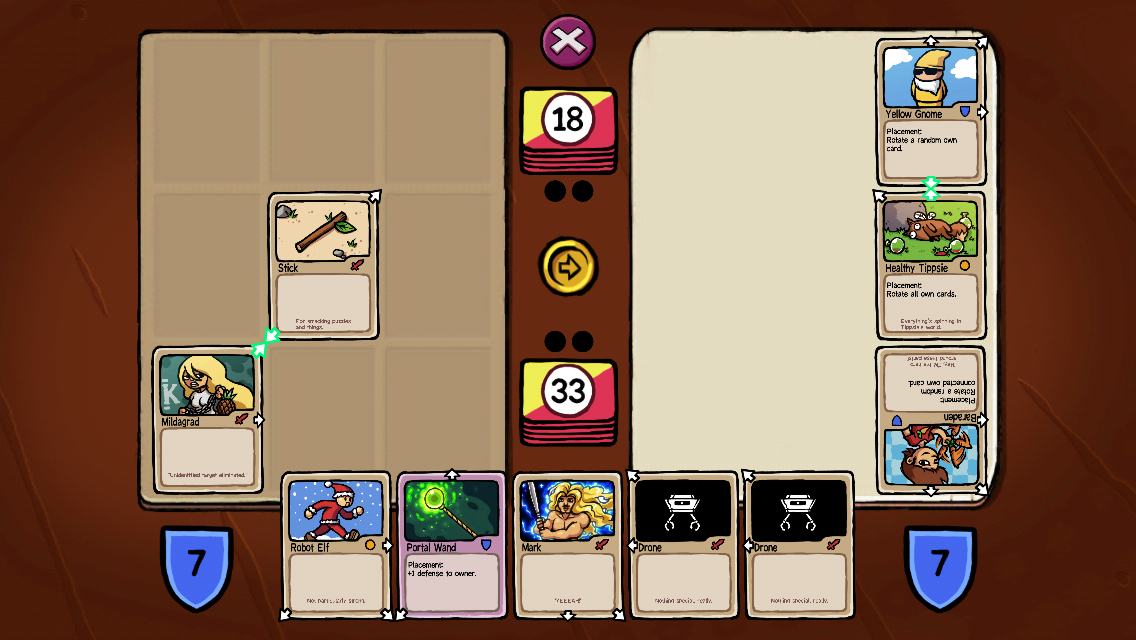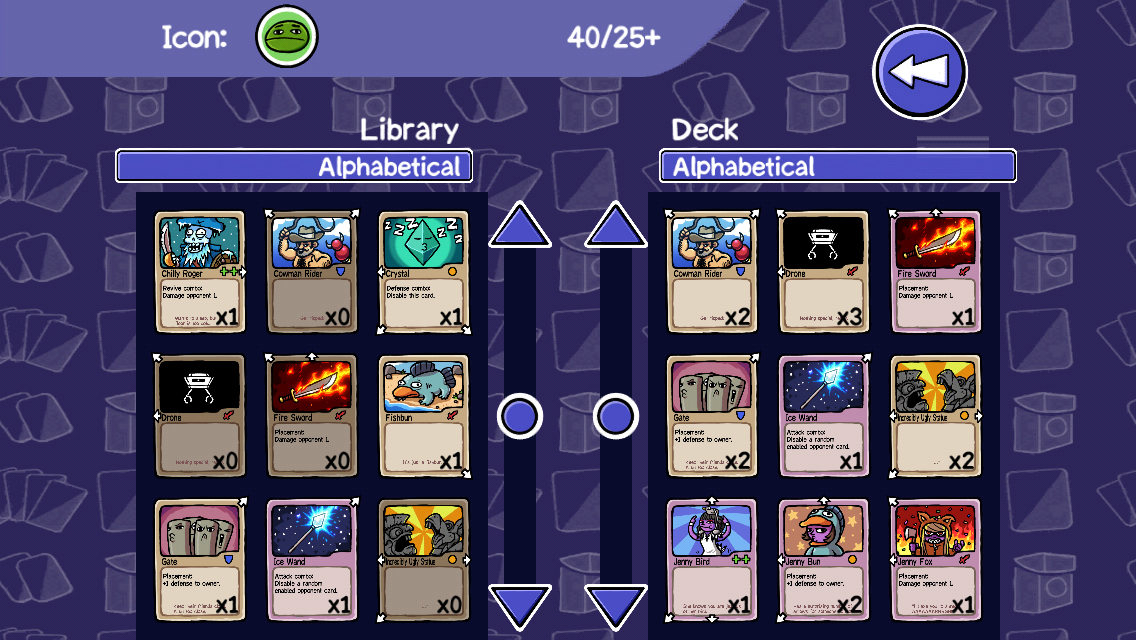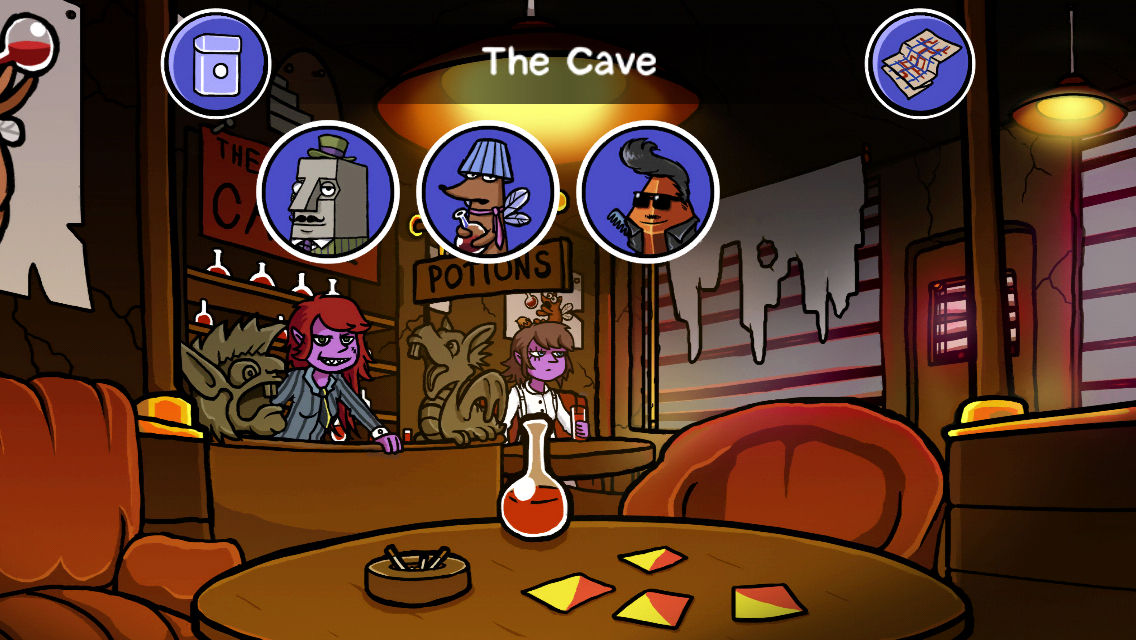 When you think of card games, you usually think of sitting at a table, real or virtual, with other people, shooting the breeze and enjoying a nice, strategic social activity. It’s not all that shocking, then, that most video card games are also geared towards multiplayer, with single player usually amounting to little more than an AI opponent you can practice on to learn the rules of the game in order to get ready for the real thing. Every once in a while, though, you get a game that really makes a strong effort to flesh out the single player experience into something resembling a proper game on its own. Sometimes the game does this by adding increasingly naked ladies, sometimes it throws in familiar characters from other games complete with entertaining banter, and other times it fits a bit of a quasi-RPG shell around the card battles. Card City Nights ($0.99) uses two of those three methods. The latter two, specifically. There are no increasingly naked ladies in this game.
When you think of card games, you usually think of sitting at a table, real or virtual, with other people, shooting the breeze and enjoying a nice, strategic social activity. It’s not all that shocking, then, that most video card games are also geared towards multiplayer, with single player usually amounting to little more than an AI opponent you can practice on to learn the rules of the game in order to get ready for the real thing. Every once in a while, though, you get a game that really makes a strong effort to flesh out the single player experience into something resembling a proper game on its own. Sometimes the game does this by adding increasingly naked ladies, sometimes it throws in familiar characters from other games complete with entertaining banter, and other times it fits a bit of a quasi-RPG shell around the card battles. Card City Nights ($0.99) uses two of those three methods. The latter two, specifically. There are no increasingly naked ladies in this game.
Card City Nights comes from Ludosity, the developers behind the extremely charming Ittle Dew ($1.99). It is a single player-only adventure based around an original card game that somewhat resembles Tetra Master from Final Fantasy 9. You play as the new kid in a city that is absolutely bananas about playing cards. Upon arriving in your new home, you find a deck waiting for you and are almost instantly tackled by a Fishbun from Ittle Dew who insists on throwing down with you, planeswalker-style. It’s not long before someone slightly more eloquent than the Fishbun comes along to explain what ends up being the goal of the game to you. You need to battle players, gather clues, and win the eight legendary cards to enter the ultimate tournament and become the champion of Card City.

The basic flow of the game has you traveling through different areas of the city. In each location, you’ll find two or three opponents. One of them will be slightly easier and can be challenged repeatedly to earn multiple booster packs, while the others will be slightly more difficult, offer better rewards, but can only be challenged until you defeat them once. The last of the set will give you a clue to the location of the next legendary card and possibly cough up one of said cards themselves. The battles get harder and harder as you go, so you’ll need to constantly update and improve your deck if you want to win.
As I mentioned earlier, the card game has a lot of similarities to Tetra Master. Cards can come in several different types: offensive, defensive, neutral, revive, or blank. Each card has one or more arrows printed on it, pointing to any of the eight directions surrounding it. You and your opponent will take turns laying down cards on your own nine by nine grid, trying to make a combo of three or more cards by joining the arrows. The type of combo is determined by the types of cards that go into it. If your combo is all or mostly offensive cards, then you can do damage to your opponent or one of your opponent’s cards. If it’s all or mostly defensive, you’ll restore some of your life points. If it’s neutral, you can choose the type of combo you want to do. Finally, if a revival card is in the mix, you can restore one of your own cards that your opponent has attacked. The goal is to reduce your opponent to zero life points. Alternatively, you can win if your opponent cannot play a card due to lack of space in their play area.

It’s a pretty easy card game to learn, with most of the strategy coming from building your deck. You not only need to mindful of the type of cards you’re using, but also how they can potentially connect with one another. Your deck can be between 25 and 40 cards, though it’s better to hit the higher end in my experience since if you run out of cards to draw, you take damage every turn thereafter. There are lots of viable builds, but the easiest way to get through the game is to load up on offense. It rarely lets you down. I don’t think this is a card game that would have a lot of appeal on its own, since it’s not all that deep, but it’s engaging enough to serve the role it’s playing here. It’s basically standing in as the battle system of an RPG, and for that, it’s more than up to the task.
There aren’t experience points or levels, or anything like that, mind you. Still, winning battles against enemies will give you a booster pack and some coins, and the contents of that pack will usually make you stronger, so you do get a constant feeling of progression. You can also find coins by poking around, literally, on areas of interest in the background, very much in the style of the Professor Layton games. I should also clarify, while we’re on the subject of coins and booster packs, that there isn’t a stitch of IAP in Card City Nights. Everything can be earned by playing, and there’s virtually no grinding necessary to get through the game. Yet, you might want to grind simply to collect all of the cards, which are packed full of cute art and references to some very minor PC games. An update that rolled in as I was writing this review also added a free expansion to the game, adding some vital post-game content that adds a bit of replay value to the affair. All in all, it’s a reasonably lengthy game, with the main content lasting for several hours and the expansion adding a bit more on top of that.

Like Ittle Dew, Card City Nights is incredibly adorable. The art in the game is excellent, with the images from other series redrawn by the Ittle Dew artist to ensure consistency. All of the characters you meet are vague references to characters from those other games, and it’s fun to see items and other things pop up on the cards themselves. The writing is once again excellent, with a good sense of humor that pokes at all kinds of culture yet still maintains a certain sincerity. I hate to use a nebulous term like ‘heart’, but it really does fit the profile of this developer’s work. The soundtrack is a surprisingly good mix of jazz and hip-hop that fits the visual style of the game well. The only misstep presentation-wise is a lack of Game Center support. I feel like there could have been a really cool list of achievements for this game.
The lack of multiplayer support and the simplicity of the card game itself might turn off some hardcore fans of card games, but I’m not really sure that’s who Card City Nights is for to begin with. Rather, it feels like it’s for people with fond memories of playing the card games in the Game Boy Pokemon Trading Card Game, Final Fantasy 8 and 9, and people who are interested in twists on the RPG concept, like Harvest Moon or River King. It also goes without saying that people who dug the style of Ittle Dew should give this a look, even if it’s a very different type of game. Its attention to recreating the feeling around playing card games with your friends is a breath of fresh air for a genre that generally cuts right to the chase, and I think that’s something worth paying attention to and enjoying.